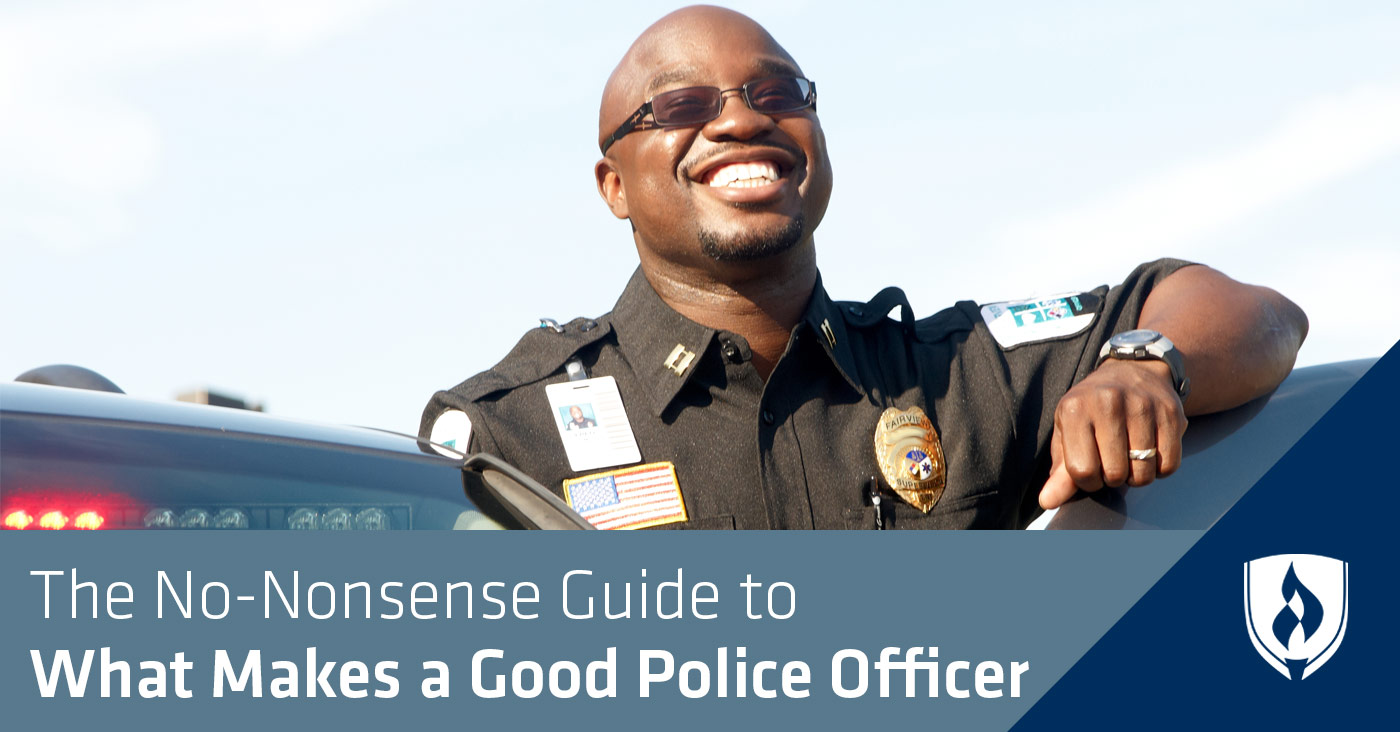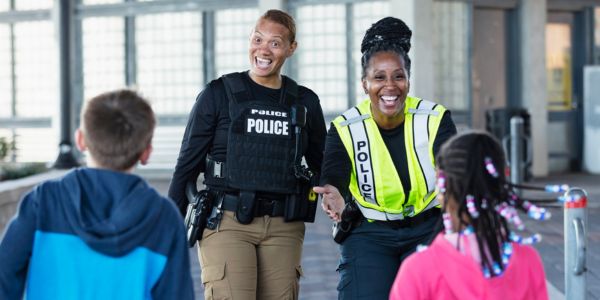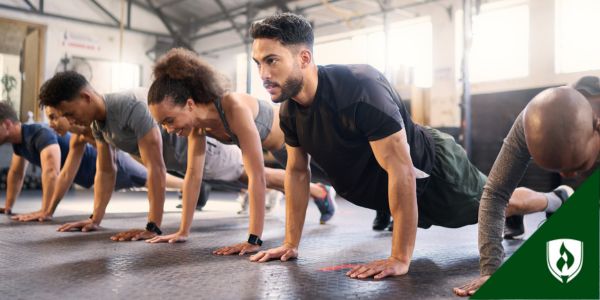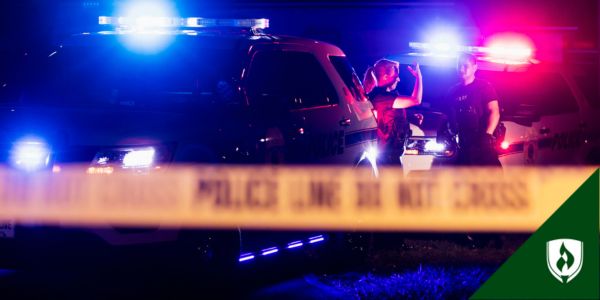
If you reflect on TV or movie portrayals of police officers, you might have a picture in your head of what a “bad cop” looks like. But since most people only interact with police officers when something has gone wrong, it can be hard to see qualities that make a truly great police officer shine.
Like any career, there will always be some professionals who are much better at their jobs. But unlike most careers, in law enforcement being good at your job can mean life and death for you or for someone else. “Police officers have an important role in the community—to keep the community safe,” says criminal defense lawyer, Tony Sun. “But being a police officer is the most stressful job in any city.”
Police training and education will help you develop the tools you need to thrive in the job. But truly great cops have more than just solid training in their corner. What makes a good police officer? We asked former law enforcement officials and the professionals who work with them for some of the qualities the best officers they know have in common.
What skills do police officers need?
A police officer’s area of jurisdiction and specialization can have a huge impact on the technical skills and knowledge they’ll need. That being said, there are several technical skills and abilities that are commonly sought after. We used job posting analysis software from Burning-Glass.com to identify some of the most frequently requested technical abilities of law enforcement officers.1
Commonly required technical skills for police officers
- Public health and safety training
- Prevention of criminal activity
- CPR
- Warrants
- Surveillance
- Traffic laws
- Investigations
- Crowd control
- Prevention programs
These areas of skill do not represent everything police officers need to know. Most law enforcement programs and police academies will offer courses and training in line with state and federal requirements for officers. To learn more about what police officers learn, check out “Police Training: A Deeper Look at Tactics, Weapons and Human Relations.”
Important soft skills for police officers
But technical skills are only part of the mix in making a good police officer. The best police officers also bring an array of traits and soft skills to the table. And employers know these baseline skills are extremely important.
Communication
For law enforcement officers, communication, people skills and emotional intelligence play a hugely important role in being effective at the job.
“Emotional intelligence is essential for defusing a potentially volatile situation and keeping things from escalating,” says attorney Matt Pinsker. “This also goes to maintaining a professional and respectable demeanor with the public that fosters good relations.”
Pinsker explains that every interaction from a simple traffic stop or responding to a crime victim to confronting a criminal requires reading people and knowing how to respond in a way that maximizes the chance of a peaceful exchange.
Relationship building
Beyond the skill of communicating and relating to people, the best police officers also know how to build effective relationships. Sun says that simply being friendly to people and showing your good intentions can go a long way toward helping your community trust you.
“Whenever the police get called to a scene, people are intimidated,” Sun says. “They know they could get in trouble.” But if officers act with courtesy and work at keeping people calm, they are likelier to get cooperative and honest results. Over time, even small relationships in the community can change situations that might otherwise be stressful or adversarial.
Critical thinking
“No other single person in society can decide who to arrest and who to take to jail.” But police officers make these choices every day, Sun points out. “That’s why good police officers need to have a strong desire to seek the truth. Other people’s lives are in your hands.”
In the jumble of a criminal investigation, not everyone tells the truth. Sun says people who aren’t even suspects can get nervous around officers and lie about what happened. Police officers need to have a real desire to get to the bottom of things, and the critical thinking skills to sift out the truth.
Rushing to conclusions is definitely not OK for police officers, Sun says. “There are two sides to every story, and every police officer needs to decide what the truth is. It doesn't need to be perfect every time, but the process of investigating needs to be done every time.”
Physical fitness
While there might be exceptions based on location and the specifics of the role, many police officers have to meet certain physical requirements. The Bureau of Labor Statistics (BLS) reports that police officers monitor regular patrols and respond to emergency and nonemergency calls. Some officers have specialized units like horseback, motorcycle, canine corps, and special weapons and tactics (SWAT).2
Officers are often expected to be able to pursue a suspect on foot, perform CPR and assist people in accidents or disaster situations if needed. But going beyond that, police officers who take their physical fitness seriously will have a better chance of thriving in the line of duty.
Some of the traits commonly associated with physical fitness—such as discipline and self-control—are also very helpful. And as Pinsker points out, sometimes just having a strong command presence can get more done. “The best officers will, upon arrival at a scene, put out an aura that they are in control,” Pinsker says. “It also helps get people to cooperate.”
Self-control
“The best police officers excel at keeping calm,” Sun explains. “Situations get out of hand, suspects are desperate to not get caught, and people get emotional.” When officers need to de-escalate a situation, the habit of keeping their own emotions and reactions in check makes a big difference. There might be a million concerns running through an officer’s mind, but they’re best served to be like a duck in water—visibly calm and collected while working hard out of sight to keep afloat.
“Keeping calm will calm suspects down, buy you time until backup arrives, and will help keep you and everyone else safe,” Sun says.
Would you make a good police officer?
On paper, these traits and skills can all add up to a good police officer. But success for a police officer can also come from the unique combination of experiences and attributes that you bring to the table. If you could see yourself serving and protecting your community, this career choice might be right for you.
If a career in law enforcement sounds appealing, you’re probably wondering what it takes to become a police officer. Check out our article, “How to Become a Police Officer: Your Step-by-Step Guide,” to see what it takes to reach your first patrol.
Interested in different types of law enforcement? Check out our other article about conservation officers.
1Burning-Glass.com (analysis of 14,357 police officer job postings, Nov. 1, 2017 - Oct. 31, 2018)
2 Bureau of Labor Statistics, U.S. Department of Labor, Occupational Outlook Handbook, [information accessed January 25, 2019] https://www.bls.gov/ooh/




